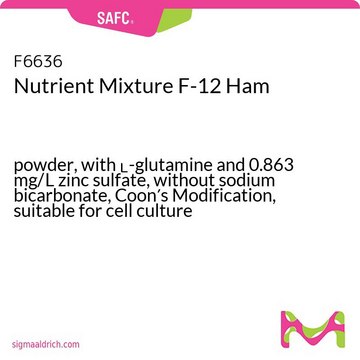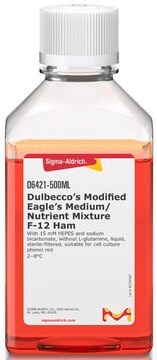51651C
Ham′s Nutrient Mixture F12
liquid
Sinônimo(s):
Nutrient Mixture F12 Ham’s
Faça loginpara ver os preços organizacionais e de contrato
About This Item
Produtos recomendados
descrição
for research or for further manufacturing use
with 1.0 mM L-glutamine
esterilidade
sterile
Formulário
liquid
qualidade
for further manufacturing use
técnica(s)
cell culture | mammalian: suitable
componentes
NaHCO3: 1176 mg/L
sodium pyruvate: 110.1 mg/L
phenol red: 1.274 mg/L
L-glutamine: 146.2 mg/L
Condições de expedição
ambient
temperatura de armazenamento
2-8°C
Procurando produtos similares? Visita Guia de comparação de produtos
Aplicação
Ham′s Nutrient Mixture F12 was originally developed for the serum-free clonal growth of Chinese Hamster Ovary (CHO) cells, lung cells, and mouse L cells. It is frequently used with dialyzed serum, hormones, selenium, and other supplements for serum-free cultures. It is the medium of choice for supporting the growth of cells of rodent origin, particularly rabbbit and rat, and has been proven to be an excellent cloning medium for myeloma and hybridoma cells.
suplemento
Nº do produto
Descrição
Preços
Código de classe de armazenamento
12 - Non Combustible Liquids
Classe de risco de água (WGK)
WGK 1
Ponto de fulgor (°F)
Not applicable
Ponto de fulgor (°C)
Not applicable
Escolha uma das versões mais recentes:
Já possui este produto?
Encontre a documentação dos produtos que você adquiriu recentemente na biblioteca de documentos.
Os clientes também visualizaram
Hard and Soft Tissue Cell Behavior on Polyetheretherketone, Zirconia, and Titanium Implant Materials
Mariana Brito da Cruz et al.
The International journal of oral & maxillofacial implants, 34(1), 39–46-39–46 (2018-10-04)
The aim of this study was to characterize and compare the behavior of human osteoblasts and human gingival fibroblasts in contact with polyetheretherketone (PEEK), zirconia, and titanium implant surface materials. PEEK, yttria-stabilized zirconia (YTZP), and titanium discs were produced under
Jing Xu et al.
PLoS biology, 18(10), e3000837-e3000837 (2020-10-06)
Amyloid-β (Aβ) accumulation in the brain is a hallmark of Alzheimer's disease (AD) pathology. However, the molecular mechanism controlling microglial Aβ phagocytosis is poorly understood. Here we found that the E3 ubiquitin ligase Pellino 1 (Peli1) is induced in the
Anca Ungurianu et al.
Oxidative medicine and cellular longevity, 2020, 3580934-3580934 (2020-07-21)
Ionizing radiation induces genomic instability in living organisms, and several studies reported an ageing-dependent radiosensitivity. Chemical compounds, such as scavengers, radioprotectors, and modifiers, contribute to reducing the radiation-associated toxicity. These compounds are often antioxidants, and therefore, in order to be
S Mahmoudi et al.
Cell death & disease, 2, e114-e114 (2011-03-04)
We previously identified WRAP53 as an antisense transcript that regulates the p53 tumor suppressor. The WRAP53 gene also encodes a protein essential for Cajal body formation and involved in cellular trafficking of the survival of motor neuron complex, the telomerase
Olga Blaževitš et al.
International journal of molecular sciences, 21(7) (2020-04-01)
The circadian transcriptional network is based on a competition between transcriptional activator and repressor complexes regulating the rhythmic expression of clock-controlled genes. We show here that the MYC-associated factor X, MAX, plays a repressive role in this network and operates
Nossa equipe de cientistas tem experiência em todas as áreas de pesquisa, incluindo Life Sciences, ciência de materiais, síntese química, cromatografia, química analítica e muitas outras.
Entre em contato com a assistência técnica





